Tea is something I drink every single day. It’s sacred at my house – I even have a whole drawer devoted to it! I drink it because it is amazing for your health. There are so many varieties of tea that can improve digestion, metabolism and even prevent certain diseases. This investigation into tea ingredients has been in the making for a long time. What I’m about to share with you totally rocked my world forever and I’ll never look at tea in the same way again. Do you really want to know what’s in your tea?…Then read on.
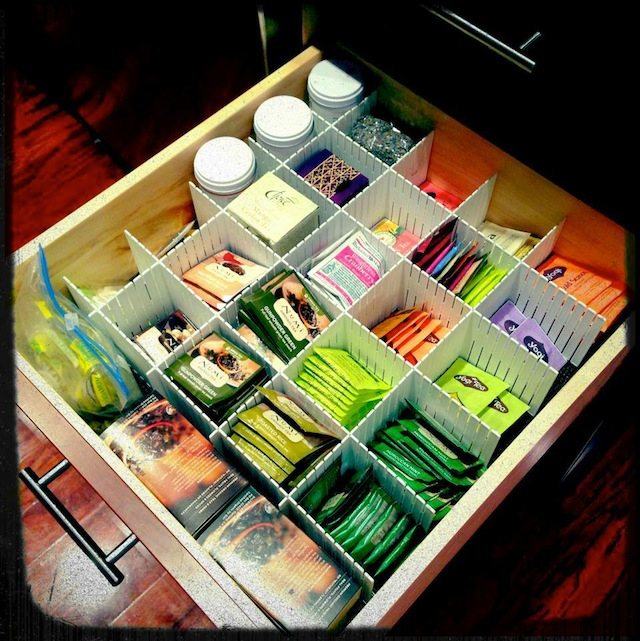 The ancient Chinese tradition of drinking tea dates back thousand of years to the early Chinese dynasties and aristocrats who drank the beverage for its medicinal properties. In ancient times, leaves from the Camellia Sinensis (the tea plant) were either ground into a powder or placed as loose leaves directly into water to infuse it with herbal essence. Unfortunately, modern day tea is nothing like the unadulterated version of old tea. Many of today’s tea brands are operating under the guise of providing health benefits and promoting clean living, but are actually laden with pesticides, toxins, artificial ingredients, added flavors and GMOs.
The ancient Chinese tradition of drinking tea dates back thousand of years to the early Chinese dynasties and aristocrats who drank the beverage for its medicinal properties. In ancient times, leaves from the Camellia Sinensis (the tea plant) were either ground into a powder or placed as loose leaves directly into water to infuse it with herbal essence. Unfortunately, modern day tea is nothing like the unadulterated version of old tea. Many of today’s tea brands are operating under the guise of providing health benefits and promoting clean living, but are actually laden with pesticides, toxins, artificial ingredients, added flavors and GMOs.
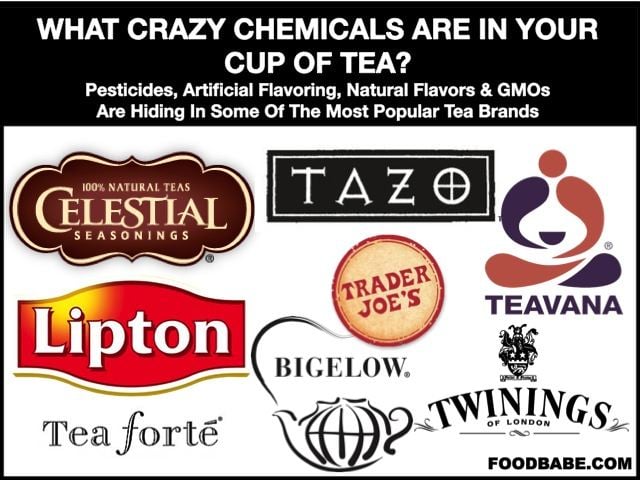
Conventional Teas – An Abundance of Pesticides
Did you know that most tea is not washed before it is put it into bags? That means if the tea was sprayed with cancer-causing pesticides, those pesticides go directly into your cup. And this is the reason why tea is on my organic shopping priority list. To prove this point, here are some shocking facts about one of the most well-known tea brands – Celestial Seasonings.
A recent third-party analysis by Glaucus Research and discussed here found that 91 percent of Celestial Seasonings tea tested had pesticide residues exceeding the U.S. limits. For example, Sleepytime Kids Goodnight Grape Herbal contained 0.26 ppm of propachlor, which is a known carcinogen under California’s Propsition 65.
The “Wellness” tea line was found to contain traces of propargite, also a known carcinogen and developmental toxin. The FDA has already issued two warning letters to Celestial Seasonings in regard to poor quality control according to this source. Imagine what happens when pesticide-laden tea is steeped in boiling water.
If grocery store brands don’t provide a clean option for you, perhaps a high-end loose leaf tea would circumvent some of the issues of grocery store brands. Right? Wrong! Take Teavana, which is found in malls across North America for example. Teavana taps into tea culture with the “Teavana Experience.” Convincing their employees to take customers on a sensory journey – they open a huge canister of loose leaf tea and wave the top of the canister so you can smell the tea – touting all of the wonderful health benefits of tea complete with samples and manipulative demonstrations that end in an expensive visit to the tea shop. Is all the extra money worth it? Are customers getting a superior tea product? No.
Teavana tea was tested by an independent lab and 100 percent of it was found to contain pesticides. One tea in particular, Monkey Picked Oolong, contained 23 pesticides. 77 percent of the teas would fail European Union pesticide import standards, and would be banned from import. 62 percent of the teas tested contained traces of endosulfan, a pesticide that has been banned by the U.S., China, the E.U., and 144 other countries because it has been linked to impaired fertility and could harm unborn babies.
UPDATE (May 27, 2014): Glaucus Research funded the research done by Eurofins Scientific (an independent lab) and admits on their disclaimer that they are biased because they would make money if Hain’s stock declines. However – I am not sure that Eurofins’ research should be completely discounted on this point alone. Since I wrote this post, Celestial has been sued in a class-action lawsuit based on the pesticides that Eurofins found in their teas and for mislabeling of them as “100% Natural”. The jury is still out on whether Eurofins’ research will be considered legit, as this case is still active in California. The Plaintiffs contend that Celestial’s teas contain “pesticides, herbicides, insecticides, carcinogens, and/or developmental toxins (collectively, “Contaminants”)” and Celestial “did not dispute – and has never disputed – that the tea Products contained Contaminants. Nor has (Celestial) challenged the results of the Eurofins Tests” and “has not claimed that Eurofins was biased or that the Eurofins Tests were not, in fact, accurate”. Even if it is determined that Eurofins’ research was not accurate – it’s important to note that Celestial’s tea that was tested is NOT organic and some of this tea is sourced from China. Greenpeace issued a report on the alarming amount of pesticides found on tea from China, followed up by a detailed report on Lipton brand tea from China – in which they recommend only purchasing certified organic tea to avoid these pesticides. Reference law documents: Complaint; Plaintiff’s Memo in Opposition to Motion to Dismiss. Case 8:13-cv-01757-AG-AN
Teas Can Contain Artificial Flavoring, Natural Flavors, and Hidden GMOs
Furthermore, a majority of Teavana teas contain added flavor – specifically “artificial flavoring.” If their tea is so high end, why would they be adding ingredients produced by fractional distillation and chemical manipulation of various chemicals like crude oil or coal tar? Coal tar in my tea? No, thanks.
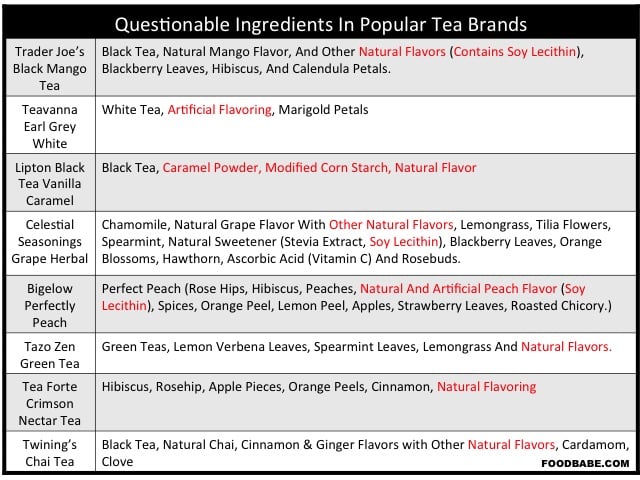
Many popular tea brands get away with using the ingredient “natural flavors” to trick the consumer into thinking they are buying better, cleaner ingredients; however companies are just covering up the inferior taste and low quality of their tea. Fortunately, there are brands that are putting the kibash on the use of natural flavors and using all real ingredients. I was happy to learn that Ahmed Rahim, CEO of Numi Tea is just as disgusted by this ingredient as I am. He said to me “You can breakdown anything that is found in nature and if it ends up tasting like the flavor you wish to use – you can add it to any product and call it NATURAL FLAVOR on the ingredient label. It could come from a stone in the ground and you’d never know.” This is why when I see the words “natural flavor” listed on a label – I put the product down and run far far away. I want to know what I am eating! Don’t you?
Additionally, the added risk of consuming possible GMOs is not something many people think about when consuming teas. Before this investigation and witnessing tea companies using modified corn starch and soy lecithin in tea (additives likely made from genetically engineered corn and soy), I didn’t think about it either! I can’t imagine having a serious soy allergy, considering all the places companies try to hide it.
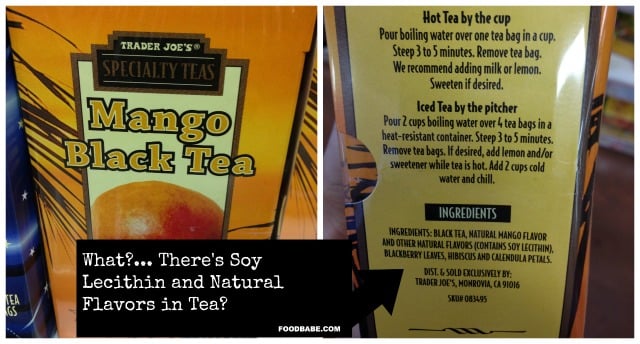
Why The Tea Bag & Packaging Matters
A recent article in The Atlantic discusses the “silky sachet” and “luxurious mesh bags” that hold loose leaf teas (like in brands Tea Forte and Mighty Leaf). Turns out, these modern day bags meant to showcase the tea leaves, are made of plastic.
PLA (polylactic acid) is a (likely GMO) corn-based tea bag material that has attracted major tea companies due to its nice look and its claims of biodegradability. Terms like “silky sachets” and “corn-based biodegradable tea bags” mislead customers into believing a product is more natural and sustainable than it really is. While the processing for PLA removes all traces of genetic material, it is still made with genetically modified corn. Although the actual tea bag is not an ingredient like teas and herbs, it is an element that is put into boiling water.
According to The Atlantic, tea bags are most commonly made from food grade nylon or polyethylene terephthalate (PET) which are two of what’s considered the safest plastics on the scale of harmful leaching potential. However, Dr. Mercola disagrees, he states:
“While these plastics are generally considered among the safest in terms of leaching potential, the molecules in these plastic tea bags may still in fact break down and leach out when steeped in boiling water…” Well, isn’t that how tea is prepared?
Another temperature consumers need to worry about in tea is the “glass transition” temperature. Here’s the science behind the glass transition temperature or, Tg, and why it becomes dangerous according to The Atlantic:
“That is the temperature at which the molecule in certain materials such as polymers begin to break down. As a rule, the Tg of a material is always lower than the melting point. In the case of PET and food grade nylon (either nylon 6 or nylon 6-6), all have a Tg lower than the temperature of boiling water. For example, while the melting point of PET is 482 degrees Fahrenheit, the Tg is about 169 degrees. Both nylons have a lower glass transition temperature than PET. (Remember that water boils at 212 degrees.) This means the molecules that make up these plastic tea bags begin to break down in hot water.”
So, while the plastic itself won’t melt in your tea, the glass transition temperature could potentially leak out harmful phthalates if there are such things in your tea. Another thing to worry about is that some of the newer tea bags are made with a variety of plastics. Some plastics are nylon, some are made of viscose rayon, and others are made of thermoplastic, PVC or polypropylene.
Beware of paper tea bags too, which can be worse than plastic tea bags.
GET THIS: Also according to Dr. Mercola, many “paper tea bags are treated with epichlorohydrin, a compound mainly used in the production of epoxy resins. Considered a potential carcinogen by the National Institute for Occupational Safety and Health2 (NIOSH), epichlorohydrin is also used as a pesticide. When epichlorohydrin comes in contact with water, it hydrolyzes to 3-MCPD, which has been shown to cause cancer in animals. It has also been implicated in infertility (it has a spermatoxic effect in male rats) and suppressed immune function.”
So what do you do the next time you want a cup of tea? Antioxidant rich teas aren’t going to do much to counterbalance the chemicals, additives and artificial flavorings in today’s modern teas.
First, I recommend looking at this chart below to see how your favorite tea brand stacks up:
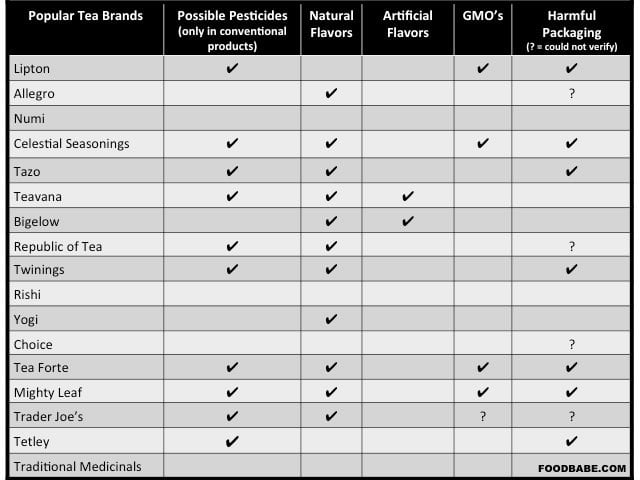
And then when brewing and picking out the safest tea remember these tips:
1. Choose an organic & non-GMO certified brand of tea. (My favorites are Numi, Traditional Medicinals, and Rishi Tea (loose leaf)).
2. Check the ingredient list on the back of the tea package to make sure there are no added flavors, GMO ingredients like soy lecithin and corn starch added to the tea leaves.
3. Make sure the brand you buy uses a safe form of packaging material or buy loose leaf tea and use a stainless steel or glass tea strainer. Have the company verify that bags do not contain epichlorophydrin, and avoid plastic tea bags all together. (Numi and Traditional Medicinals are some of the only brands I trust in this category because they have publicly stated they do not use this harmful ingredient or GMO packaging and are Non-GMO Project verified.)
4. The majority of restaurants use some of the most pesticide ridden tea and brands that have harmful packaging like Celestial Seasonings, Lipton, etc. Don’t fall victim to this. Bring your own tea when eating out or going to restaurants and ask for pot or cup of boiling water (remember to leave a good tip if you do this). I even do this at Starbucks because I like to vote with my dollars and not buy tea brands that are harmful. If you drink iced tea, brew your own at home and carry an insulated water bottle with you.
5. Remember these temps and times for brewing the perfect cup of tea
If you know someone who loves to drink tea, please share this post with them. I was just as shocked as you probably are about all of this craziness – knowing what’s in our tea and what we put in our body matters! Let’s change the world together.
Xo,
Vani


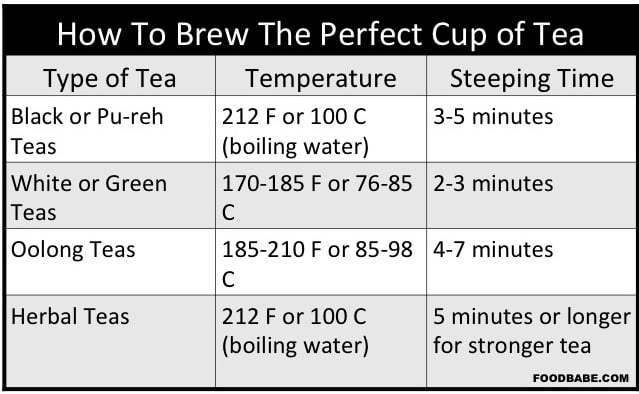

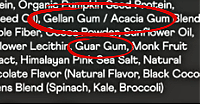
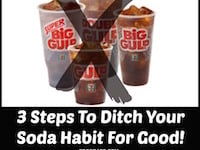
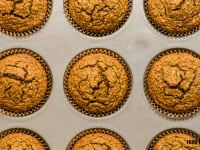


This is my response from Yogi:
Hi Tammy. We appreciate you tagging us in your post and allowing us at Yogi to provide you with complete and accurate information about our teas. To say the least, we were disappointed to read Food Babe’s blog, and can confirm that it contains explicitly inaccurate and misleading information about our teas.
Here at Yogi, we source the highest quality herbs and botanicals from around the globe, and none of our teas contain any artificial ingredients. We follow the National Organics Program (NOP) for all of our ingredients. We are extremely selective and work only with vendors who can document that they meet the NOP requirements for each ingredient we purchase from them. According to the standards set forth by the NOP, we do not accept any conventional raw ingredients contaminated by GMOs, pesticides, sewer sludge, ionizing radiation, or artificial ingredients.
With regard to our tea bag filtration paper, we currently use a non-heat sealable paper made from a select blend of high quality manila hemp (abaca) fibers and wood pulp. The filtration paper does not contain epichlorohydrin or plastic. It is oxygen bleached using a natural process that is completely free of chemicals or toxins. In addition, our tea bag filtration paper does not contain gluten, GMOs, corn nor any of the eight FDA recognized allergens (tree nuts, peanuts, milk, eggs, fish, crustacean shellfish, wheat or soybeans).
We hope that this information adequately addresses your questions and concerns.
++++
What sayeth you, Food Babe?
Dude. I had an issue with one of her previous postings about Trader Joe’s now this one? It’s making me reconsider reading this blog.
Wow…I would like to see your response to this Food Babe!
Another question for food babe: I was wondering if you contacted the companies directly about your concerns? While I agree completely with you about most of this info, this email from Yogi concerns me that you would put out potentially inaccurate info.
The response from Yogi is b.s. FB never discredits Yogi in her article. She only says that their non-organic line is cultivated with the use of pesticides, and that she doesn’t know which type of packaging process they use. Those of you who complained to Yogi and the Yogi representatives responding to your emails clearly did not read FB’s posting comprehensively. The only time Yogi is mentioned is in the brands comparison table. You’re putting words in her mouth, thus causing companies to defame her. Please read her postings carefully so this ridiculousness doesn’t happen again.
I’d like to preface this by stating I am one of fb’s biggest fans. That being said, I’d like to address your response, Kristin.
First, the response from Yogi is not b.s. They have a valid concern. Yogi bags (in FB’s above chart) were questionable. Secondly, she specifically states that Numi and Traditional Medicinals are the only ones who state [the safety of their bags] publicly. Thirdly, Yogi took less than 10 minutes to reply to my query and were shocked at FB’s blog post (file them under the last to know). And, lastly, the chart ALSO specifically ‘checks’ that certain Yogi teas contain pesticides.
Now who’s not reading comprehensively?
Sarah – Yes, of course I contact companies. Actually – I requested a meeting with YOGI to discuss their the amount of pesticides found on their conventional teas. I find it extremely worrisome that all their teas are not certified organic. Also they do use natural flavors (which they of course don’t mention in their response). I am fighting for the consumer, my friends and family to have safe food – not anyone else. I find it surprising people would question my intentions after all the work I have put into this research and blog.
FB, I want to thank you for all you do!!! I wonder if Newman’s Own Organics tea bags can be trusted.
first, thanks for getting the information out to us all.
second, do you have any recommendations for those of us that cannot afford organics and are “stuck” with supermarket brands? I did not see Red Rose tea listed.
I’ll await your reply.
You’re never stuck with supermarket brands. There’s actually a really great distributor with EXCELLENT prices, who’s located near me in Holliston, MA. They do all loose leaf teas, some flavors, some herbals, they mark organic products in their catalog and they give samples of something new for you to try in your order.
I LOVE this company! The service is great and the selection is massive. Oh, and did I mention, they’re far cheaper than that bagged and over marketed crap you’ll find on store shelves. 😉
Vani, maybe you could investigate the teas that come from Upton Tea Imports? A lot of restaurants get their products from them, so it would be good to know what people are getting when they go out.
Hi Britt – What’s your issue with the TJ’s post?
You’re ingredients were not contaminated by ionizing radiation, huh? So, they weren’t exposed to SUNLIGHT (contains ionizing ultraviolet radiation) or DIRT (contains scant but ever-present radioisotopes which emit ionizing radiation)? What did you use to grow your tea, grow lights and aquaculture? There’s ionizing radiation hitting every square inch of the surface of the Earth from cosmic rays. Is your grow room thousands of feet underground? Pretty impressive!
Some Rishi teas, like the Coconut Oolong, do have artificial flavorings, and a lot of them do have natural flavorings too. However, most of them are good quality – fair trade, organic and flavoring free.
Exactly, Selena. I love FBs blog, but some of the info in this post isn’t complete. Traditional Medicinals isn’t 100% organic either! For those that really care, they should know and be getting accurate info. #justsayin
Just remember that not all organic food is “certified organic” just like not every company can pay the big bucks to buy the (now somewhat deceptive) “Fair Trade” label. Some companies do use organic farming methods but cannot afford the qualification process (which is lengthy and expensive). This is especially true for the small companies–which could be mom and pop sized corporations. I wish every company could, and hopefully some day every company can.
Thank you so much for this post. Very informative… and disappointing! I think I’ll go back to loose leaf tea and avoid the bags all together.
Is it true that drinking black tea lowers cholesterol? My husband has been drinking 3-4 large cups of black Lipton tea to lower his cholesterol. I see in the above information that there are added toxins. 🙁 Cant win it seems.
Just purchase an organic reputable black tea (try an Asian market). 🙂
too much caffeine is not good for you. 3-4 cups of tea is excessive, plus the caffeine is dehydrating. He should make sure to drink 6-8 glasses of water a day as well.
Is your husband doing anything else to try to lower his cholesterol? Eating more fresh vegetables, and fibre, less saturated fats, exercising? Here is a good source of information: http://www.heart.org/idc/groups/heart-public/@wcm/@hcm/documents/downloadable/ucm_300460.pdf
In a world, around the clock being blanket sprayed with chemtrails, I wonder whether there is any food product left that may be called ‘safe’…
Dear Food Babe,
Can you tell us who funded this article? I see that Yogi tea has already refuted your report on their bags. Did you actually verify facts with the other companies besides Numi and Traditional Medicinals? I’m sorry, but this does sound like it wants to feed into all the fear-mongering going on in America these days. It is a very dangerous thing to share information as fact, when in fact, the facts have not been checked and double-checked by independent sources.
I do hope you will check again with Yogi and all the other companies that you have villified in your posting.
Best wishes (and I truly do mean that)
She does NOT vilify Yogi! Here’s proof of the ONLY claim she makes about Yogi, that they have a non-organic line cultivated with pesticides. She made claims about Celestial Seasonings and Teavana not Yogi. You guys are putting words in her mouth. Before you decide to think that FB is full of it, re-read her posting, the time with the comprehension level of an 8th grader.
Kristin, Adriene was very respectful in her comment- i don’t think it warrants the rudeness and immaturity with which you answered her.
I wasn’t being rude, just blunt in response to the commenter’s evident misconception of the posting (“I see that Yogi tea has already refuted your report on their bags.” There is no “report” on Yogi’s bags–>lack of overall comprehension). The tone of text/type usually comes across harsher than it would were it spoken.
I have to agree with Kristen. There is only one reference to Yogi tea and that is in the chart. I can understand her frustration with people have a bit of tunnel vision!
To me it looks like NUMI did! FB shared a Numi discount on her Facebook page… there are Numi ads on her blog… hmmmm. And the article only has good things to say about them? I’m not saying Numi isn’t good tea – I love Numi tea – but given that and some of the stuff that’s being refuted, it begs the question at least!
I enjoy your findings and read them and avidly take notes.
Flavoring in tea is sadly unavoidable when the tea companies are trying to make American tea drinkers happy… the majority of which always want more. I am the owner of Louisville Tea Company and I can tell you that the best way to get tea is from a tea lover! From the small tea shops! Many of us will of course carry the flavored teas, because that is how we stay open as a business, but we are more likely to source the best teas for you without solely thinking about profit margins. If you want healthy teas, get traditional and organic. Also, I realize that my shop doesn’t offer as much as I want it to right now, but we are making the transition to more organic teas. When everyone is still shopping for bagged tea, the small tea shops have to struggle and make do. Help us grow so that organic teas can become a higher demand and all of us will benefit.
I drink Bigelow Organic Green Tea and Rooibos with Asian PearTea (which has “natural flavors in the ingredients) every day. I have written them and inquired about their packaging. I buy almost everything organic, and I have never thought about the packaging being unsafe. So, thank you for this post.
Where does STASH tea fall on your list? Do they use pesticides?
I was wondering the same thing! Stash my favorite tea company. It makes up about 90% of my tea consumption. I noticed that their organic line is growing and I try to buy it when I can. But I am wondering about their other teas.
On a side note, I NEVER buy Teavana. They always seemed like the McDonald’s of tea and going into that store is an irritating experience because they are always so pushy. In addition, I’ve never seen anyone leave there without spending an arm and a leg. For that kind of money, I’d rather buy organic and support a smaller business.
It’s really hard to eat and drink perfectly. You have to make your choices according to what is available and what you and your family can afford. I believe in voting with your dollars and sweating a lot. Getting rid of the toxins is really important because other than food, it’s everywhere in our environment anyway.
Stash is one of my favorites too. Based on their website, it looks like they use soy lecithin in some of their products, but use wood cellulose tea bags. unfortunately, they can call maltodextrine whatever they want, I call it a sugar I don’t consume. I’m very sad that I will now have to be hypervigilant with my Tea as well. http://www.stashtea.com/info/FAQ
I stopped drinking the typical grocery store brands (lipton, bigelow, twinings) a few years ago when I noticed aspertame in an herbal blend I used to like.
This was an excellent post and clearly struck a nerve with so many readers!
Are you familiar with Prince of Peace 100% Organic Premium Peony White Tea? It’s made in China (which I’m not thrilled about given their track record on food safety) and I buy it from Whole Foods. I like White Tea better than Green Tea because of the milder flavor and the fact that it’s supposed to contain less aluminum in the leaves than Green Tea.
How can I find out about this particular brand? Or is there any other Organic White Tea brands you would recommend?
Any advice would be greatly appreciated!!
Thank you for all that you do!! 🙂
Kelly
I’ve been using Pukka detox tea. the box mentions being certified organic by USDA, Canada, and another symbol that I don’t recognize, *GB-ORG_05 Non-EU agriculture.. Kosher, and a symbol re climatecare. They claim to be 95% organic and ethically sourced. However, no info re GMOs or the bags they use. I’ve been on their website and really have come away no wiser. (www.pukkaherbs.com). I’m guessing if products are non-GMO, then most companies want to brag about it, so am guessing this tea will be moved to the trash as well.
Davidson’s Teas claim they use only pesticide & GMO free ingredients in their teas. Not sure about the bags, but I use their bulk teas in my own stainless steel tea ball.
http://www.davidsonstea.com/our-product-integrity.aspx
I think Vani needs to use a bit more rigorous methodology (and publish it) in her investigation of products so that:
a) consumers can really trust her reports to be definitive and know what parts she’s tested for independently & what parts she is taking the mfg’s word for.
b) no mgf gets unfairly labeled as selling bad product due to sloppy or unquantifiable ‘investigative or reporting methods’.
I couldn’t agree more, James! For someone who claims to be a researcher with only the public’s best interest in mind, you’d think more time would be put into validation of facts. And I don’t want to hear that there’s not time to research every thing. At least have complete and accurate information about what you DO include in your report. I think it’s pretty obvious that isn’t the case here.
Regarding glass transition temperature (Tg) from the very same Atlantic article:
“If the question is, ‘As the polymer goes through that transition state, is it easier for something to leach out?’, the answer is yes,” said Dr. Ray Fernando, professor and director of polymers and coatings at Cal Poly San Luis Obispo. “However, just because it makes it easier for something to leach out, it doesn’t mean it will.” There seems to be something in the plastic collective consciousness that says there are inherently toxins in all plastics, and when they begin to break down, they will naturally gravitate toward food. “This would only happen if there are potential materials trapped in the substance. What we don’t know is what FDA requirements manufacturers have to meet before they go to market,” said Dr. Fernando.
There is also a matter of whether or not the leachate is hydrophobic or hydrophilic. If hydrophobic pollutants were potentially in the plastic tea bag materials, their nature would be to stay in the bag and not go frolicking into the water and into your mouth.
So polymers will only leach out harmful chemicals, like cancer causing phthalates, at their glass transition temperature if there are said phthalates to begin with. It almost seems silly to think that either of these materials would have toxins to begin with, considering we eat off of them and in them. That’s what food standards are for, right?
Regarding glass transition temperature (Tg) from the very same Atlantic article:
” “If the question is, ‘As the polymer goes through that transition state, is it easier for something to leach out?’, the answer is yes,” said Dr. Ray Fernando, professor and director of polymers and coatings at Cal Poly San Luis Obispo. “However, just because it makes it easier for something to leach out, it doesn’t mean it will.” There seems to be something in the plastic collective consciousness that says there are inherently toxins in all plastics, and when they begin to break down, they will naturally gravitate toward food. “This would only happen if there are potential materials trapped in the substance. What we don’t know is what FDA requirements manufacturers have to meet before they go to market,” said Dr. Fernando.
There is also a matter of whether or not the leachate is hydrophobic or hydrophilic. If hydrophobic pollutants were potentially in the plastic tea bag materials, their nature would be to stay in the bag and not go frolicking into the water and into your mouth.
So polymers will only leach out harmful chemicals, like cancer causing phthalates, at their glass transition temperature if there are said phthalates to begin with. It almost seems silly to think that either of these materials would have toxins to begin with, considering we eat off of them and in them. That’s what food standards are for, right?”
I use Prince of Peace teas (green and oolong)…do you have any stats on that?
Thank you for this informative and helpful information. As a veteran tea drinker for many decades and one who ingests copious amounts of this stuff, I’m grateful.
I was wondering about what some of the tea bags were made of – thanks for answering that question. It makes me angry to think of the time I am spending brewing ice tea at home to avoid HFCS and turns out I’m drinking pesticide instead.
I find it suspect that she lists Teavana as using harmful packaging because their loose leaf teas can be brewed in multiple infusion devices, so that choice is really up to the customer. Also, if you actually read the ingredients on the teas the artificial flavors are other natural flavorings. For example: the Watermelon Mint Chiller lists artificial flavoring because honeydew is used to “artificially” create the flavor of watermelon as the latter does not dehydrate well. I’m curious as to her standards on pesticide use because Teavana bases it’s health restrictions on EU standards (even when shipping to the US) and they are much more stringent than the US on food safety. We all know that large amounts of pesticides are dangerous for us. I do not, however, see any kind of comparison for the amount of pesticide found in each tea. We live in a world today that is sadly overrun by chemicals, and at this point it’s literally impossible to find a plant on earth that has not been genetically altered by chemical or plastics production. I may sound totally biased, but it’s something I’ve done a lot of research into. My last comment may be a bit snobbish, but it’s hard to take anyone seriously who complains about health but admits they drink bagged tea. The tea use for teabag production is called “fannings”. It is whatever bits and pieces (including debris) are left over once the whole tea leaves have been sold. Add in time in warehouse and on store shelves and you have some of the lowest quality tea ever. That’s why I only drink whole leaf teas that I can track their origin and packaging for shipping. For someone to call themselves a tea addict and then admit they drink Celestial Seasonings is laughable.
thank you for the article. while some of the more minor points may be contested, the overall assessment is pretty spot on, in my opinion.
like anything we consume, knowing the source, the grower, the conditions is critical. creating products from these components in a clean environment with integrity is paramount.
as a founder of a tea company dedicated to sustainability, transparency, and organics, i enjoy the dialog. we all learn. and the dialog itself evolves as we all learn more.
i source directly. meaning i travel to origin, to farms. i meet with growers and producers. i analyse the tea plants (or trees, in the case of yunnan). I inspect the methodology. i create relationships.
i import, procure, and blend only organically grown teas. i only work with organic herbs, flower, spices, and extracts.
while we do sell a small line of corn-silk sachets, 99% of our sales are loose-leaf. 100% of our teas are organic.
we don’t hedge on quality, because we think it is totally worth it. for the health of the soil, plants, workers, producers, and tea drinkers.
no system is 100% flawless. but we do everything we can to ensure purity. it is a lot of work. if people choose to go the “conventional route”, that is fine. having real choices is where it is at.
thank you for your dedication to organics, food babe.
jeffrey lorien
ceo/founder
zhi tea
austin, tx
Wow, a producer that thanks for transparency! Nothing turns me off more than spin because no company worth their salt should be afraid of complete transparency. I’m off to your website to find out a little bit more about your teas before purchasing. I’m in the market for new tea because I just had to throw out a drawer-full of it. I’m hoping to find some I like.
thank you. feel free to contact me directly with any questions too.
very excited, in two weeks i am off to china to inspect a farm we get a fair amount of organic tea from, in the yellow mountains.
jeffrey
founder
zhitea.com
[email protected]
I would definitely would have liked more than traditional store brand teas involved in this study. I love my teas and have bought loose leaf teas throughout the world. Like others have commented what about marriage freres, Churchill, Harney and sons, davidsons, etc. Could we as consumers get this information from these companies? My husband worked for a company that sold paper products to the tea companies that made the tea bags, and when I questioned his colleague on the use of chemicals in their natural product(abaca) he replied “all processes use chemicals in some quantity to make the paper product”. Therefore, I do not know how safe we can be using those tea bags so I personally have opted for loose leaf tea with a stainless steel infuser.
How about English teas like PGTips ?
http://www.arborteas.com is the best company for tea. Organic tea with compostable packaging!
do you know anything about mate factor, or yerba mate I think its called…I have been drinking this they sell it at the local natural store but I am not sure…
The safest thing to do at this point is to find an organic source of pure yerba mate (tea). Over here at circleofdrink.com, that’s all we do: provide the cleanest, safest, purest organic yerba mate tea. It’s not worth it to be drinking all those chemicals.
Son of a–looks like I’ll be ditching my entire tea stash and starting all over again. I feel betrayed as hell by Trader Joe’s and Yogi.
I feel your pain! I had a drawer so full of tea I had to stack it. Now I’m down to one small bag. I suppose I should have known better before purchasing anything without a USDA organic label (for what that’s even worth anymore), but I was bummed! All that money and waste on the curb. Buyer beware indeed!
Interesting article. Can I assume all 100% organic teas are okay to drink, or do they also contain products that should be avoided? I purchased a white organic tea from Touch Organics. Never had it before. The loose tea comes in pyramid mesh bags. I wrote the company to see what the bags were made of and am awaiting a response. Wondering if the organic is okay to drink? Thanks so much for your research!!
I drink Salada brand green tea. I switched from other brands that had soy leticin when I made the decision to avoid soy. My husband and I do drink decaf Lipton for our iced tea so I’ll be looking at other options for that. Can you tell me anything about Salada?
You definitely need to buy organic (Salada is not) and check out the other criteria to look for in the post. Good luck!
What about Stash and Good Earth?
This is a good article. It is important to know exactly what you are consuming. I drink Bigelow Organic Green Tea. While it does come from China there are organic standards that Bigelow Tea enforces. I wrote to Bigelow Tea about epichlorohydrin in their tea bags because they use paper. Enclosed is their response. As you can read it is a good response.
If you have additional questions you can write Kathy at [email protected] or Bigelow Tea at Bigelow Consumer Questions [[email protected]]
Rest assured, our teabag paper is made from abaca fibers and is 100% biodegradable, oxygenated paper, that is bleach free and dioxin free.
Moreover, Bigelow regularly tests it products for quality and safety. I am able to confirm for you that multiple independent labs have certified that there is no epichlorohydrin in the tea bag paper that Bigelow uses and therefore, none in the cup.
We have tested for fluoride and, just to clarify, all tea does contain trace amounts of this mineral. The amount of fluoride in a cup of tea is approximately equal to that amount that is allowed in bottled water. To give you some perspective, that amount is about 2.4 ppms. A pea-size amount of toothpaste has approximately 1,000 ppms.
As a family company, your safety and confidence in our company means everything to us.
We hope this information is helpful in responding to your inquiry.
Cordially,
Kathy Perrin
Consumer Service Representative
Mail: 201 Black Rock Turnpike, Fairfield, CT 06825
Phone: 1-888-244-3569
My wife and I recently started removing chemicals from out house and the effects have been astonishing. Short list of homemade items: toothpaste, soap, shampoo, and cleaning supplies. I have had a severe thyroid problem for years and now I have hypothroidism which is low thyroid output. We obviously got rid of many endocrine disruptors because my thyroid hormone dose has been dropping significantly. I am sure this would also help anyone with diabetes.
Well that seals it .. gonna just start growing my own lol !!
What do you think about Tea Pigs? I buy their tea in the UK. I enquired about their bags and said they are made from soilon…
http://teabagfilter.com/support/soilon.html
Organic India is a really awesome great organic tea brand. I’ve read somewhere that non-organic teas contain high levels of flouride. I feel like I either saw that in the Nourishing Traditions Cookbook or Mercola.com but we always buy organic tea because of it. I love traditional medicinals and Organic India. I especially like Organic India because they treat their farmers really well.
This is very upsetting news! I spent A LOT of money at Teavana at the mall. The experience that I had was just as you described. The young employee waved the tea canister lids so that I could get the full-scented experience. I thought that I was getting very high-quality, good-flavored tea. Instead, it sounds like I was scammed. I ended up with a bunch of tasty poison in cute little bags!
I started using my metal mesh tea filter again and started using loose tea including some home grown mint. One reason was that I got bored with all the fancy brands and also noticed that the teas at WF were getting really expensive. Another idea to avoid paper bags is to use cups and bombillas with yerba mate. Hot water is poured into the cup with tea and the tea is taken from a straw like tube with a filter at the end.
I don’t buy silken teabags, as they don’t decompose and tea bags used to be a great thing to compost. Likewise the pods from Keuric tea and coffee cups. If you use single K-cups, and prey the fabric filter out of the plastic pod to compost, to reduce landfill, don’t think this is a paper product. When turning my compost I noticed ‘undigested’ pods from more than a year ago. It must be some plastic as well.
Thanks for the great information. Does anybody know where you can purchase the tea organizer that is shown in the drawer on in the first image?
thanks!
Well written and informative post FB. Thank you! I run a tea boutique in Toronto’s Entertainment District and started with over a dozen suppliers. And the lack of transparency and additives really turned me off. So much so that I started to conduct my own tea blending workshops and dehydrating our ingredients in-house. It’s more time consuming, but ultimately if a supplier can’t disclose what they are putting into their tea then I’m not going to be comfortable selling it to customers. I suspect Teavana uses an artificial flavouring in their Earl Grey White that mimicks bergamot oil (the true way of flavouring earl grey but more costly) but could be wrong.
I’ve had a lot of demand here in Toronto and the US to conduct more tea blending workshops. That has sparked me to gauge interest in putting together DIY tea blending kits. They would include in-house dehydrated ingredients (organic grapefruit rind, organic strawberries, blueberries, almonds, cacao nibs, etc), organic tea bases and natural flavourings (bergamot and jasmine oils to name a few). I whipped up a page to see if anyone is interested a little while ago and so far the interest has been positive! If any of your readers are interested the link is here: http://herbalinfusions.launchrock.com/
Dan
Thanks for sharing that Dan – very cool!
Regardless of the whole Yogi back and forth I ordered some tea from Numi yesterday afternoon and it arrived TODAY! For an 18 count box it was 6.99 and then I used the FoodBabe promo she posted on FB yesterday and standard shipping. I’m drinking a cup of the Honeybush now and I’m in love with this tea/brand! They also sent me free samples for their green jasmine iced tea which I’m looking forward to trying soon…they are winning me over for sure..and guess what? Its nots more expensive at all then Yogi really and much cheaper than Teavanna. Peace of mind and a quality company is worth it.
And for those that don’t like what FoodBabe posts why are you here in the first place? This is not her first investigation so I don understand all the issues people have with this post and the Trader Joe’s post in particular (must be she is raining on your parade?). If you don’t like it or care then move on; the negative comments I’ve seen sprinkled throughout the comments are really not necessary. Nobody can have perfect information on everything so take what you can and make your own decisions and use this new knowledge to be more careful, and make the over all best choices for you…everyone is different!
Thanks for all the work you do!
Thank you so much for this article, it gives me a heads up as to why avoiding boxed brands is a good idea.
When I want a flavored tea, I first make a cup of black or green tea, then add a flavored syrup for “flavor”. Though I usually just drink the plain tea with either lemon, honey or cream. I have fibromyalgia, osteoarthritis and a few symptoms of lupus… so I use herbs to treat all of my symptoms. I don’t use any of the above brands, preferring to get my teas in loose leaf form from Market Spice inc. http://www.marketspice.com/
This is a great article! Thanks for writing this Food Babe.
http://www.wisdomnectartea.com is 100% dedicated to only using organic or wild harvested herbs in all their blends. Check it out! for a great organic tea option! 🙂
Happy Brewing!
Does anyone drink Art of Tea…after finding out about artifical ingredients in Teavana, I began searching. The teas I order are organic and loose leaf…I don’t use bags except when making “sweet tea” for the family but I use Newman organic tea.
I was so shocked the first time I started reading labels on tea and saw “soy lecithin” in almost all of the herbal tea blends. Why on earth is an emulsifier needed in tea??? Then recently, I learned that some varieties of tea contain gluten: http://celiacdisease.about.com/od/Gluten-Free-Beverages/f/Is-Tea-Gluten-Free.htm . Craziness all around! I have happily switched to loose leaf tea, where I know exactly what I’m drinking. Thanks for an informative article.
Herbal tea isn’t real “tea”, perhaps that’s why? Just a thought. Sad what companies add to the products we consumers purchase.
lecithin is also a Natural preservative, as well as an emulsifier which obviously isn’t necessary in dry tea. perhaps that is why it is used, to keep it fresh.
I love raspberry tea (I usually buy bulk organic leaves for brewing) but I have been through three “stainless steel” brewing balls and all turned colors after use and leached something nasty-imparting a metallic taste to the tea and a sheen on top of the water if they sat for very long. They were purchased at a mart store and World market but they look identical to the ones available elsewhere-any ideas on where to find a safe strainer? I dont’ trust the “made in China” “stainless steel”
I use Alvita Chinese Green Tea, do you have any info on that?
The safest and most fun thing to do is to make your own herbal teas (tisanes) either from plants in your own garden, herbs bought from trusted organic growers at a farmer’s market, or ordered from a reliable site online. I have written a book, “Sipping My Garden, An Easy Way to Make Herbal Teas,” that presents a simple and quick way to make teas, has plant lists, and more. See http://www.seedpodpress.com to read about it and to order copies.
Other issues to consider in commercial teas is the ‘ungreen’ effect of long-distance shipping and all the packaging, the fact that in some countries child labor may used at times for picking, and that you can never be entirely certain of what you are getting.
Does anyone know where you can buy the cool tea organizer for the drawer in the first photo? Thanks!
Hi! It is from the Container Store.
Thank you so much! 🙂
This is a great article and I’m so glad I found it! Would you be willing to look into the Stash and Lollicup brands?
Hi Kristen – there are so many brands – she cannot look into them all. We encourage you to research your favorite brands. In the post, Food Babe tells what to look for. You can call or email the companies and ask questions about the packaging… Good luck! We would love to hear what you find out!
Hi Vani, I don’t see Saluda tea on your list. I drink their green tea almost every day. Is it bad or okay?
Thank you for all the hard work you put in to help us make better food choices. I appreciate you!!!!
I sent an email to Bigelow Tea concerning the epichlorohydrin in paper tea bags because I drink their Organic Green Tea. I also asked about fluoride because green tea and other teas that are not young leaves, like white tea, will pick it up from the soils.
This is their response (no epichlorohydrin) 2.4 ppm fluoride
Rest assured, our teabag paper is made from abaca fibers and is 100% biodegradable, oxygenated paper, that is bleach free and dioxin free.
Moreover, Bigelow regularly tests it products for quality and safety. I am able to confirm for you that multiple independent labs have certified that there is no epichlorohydrin in the tea bag paper that Bigelow uses and therefore, none in the cup.
We have tested for fluoride and, just to clarify, all tea does contain trace amounts of this mineral. The amount of fluoride in a cup of tea is approximately equal to that amount that is allowed in bottled water. To give you some perspective, that amount is about 2.4 ppms. A pea-size amount of toothpaste has approximately 1,000 ppms.
As a family company, your safety and confidence in our company means everything to us.
We hope this information is helpful in responding to your inquiry.
Cordially,
Kathy Perrin
Consumer Service Representative
Mail: 201 Black Rock Turnpike, Fairfield, CT 06825
Phone: 1-888-244-3569
Visit our website
Like us on Facebook
Kathy’s email
[email protected]; on behalf of; Bigelow Consumer Questions [[email protected]]
Thank you for sharing.
Now I’m not sure what to do. I love my green tea.
We have been using Bromley’s Naturally Decaf. Tea for ages. You didn’t mention that one. What do you know about it?